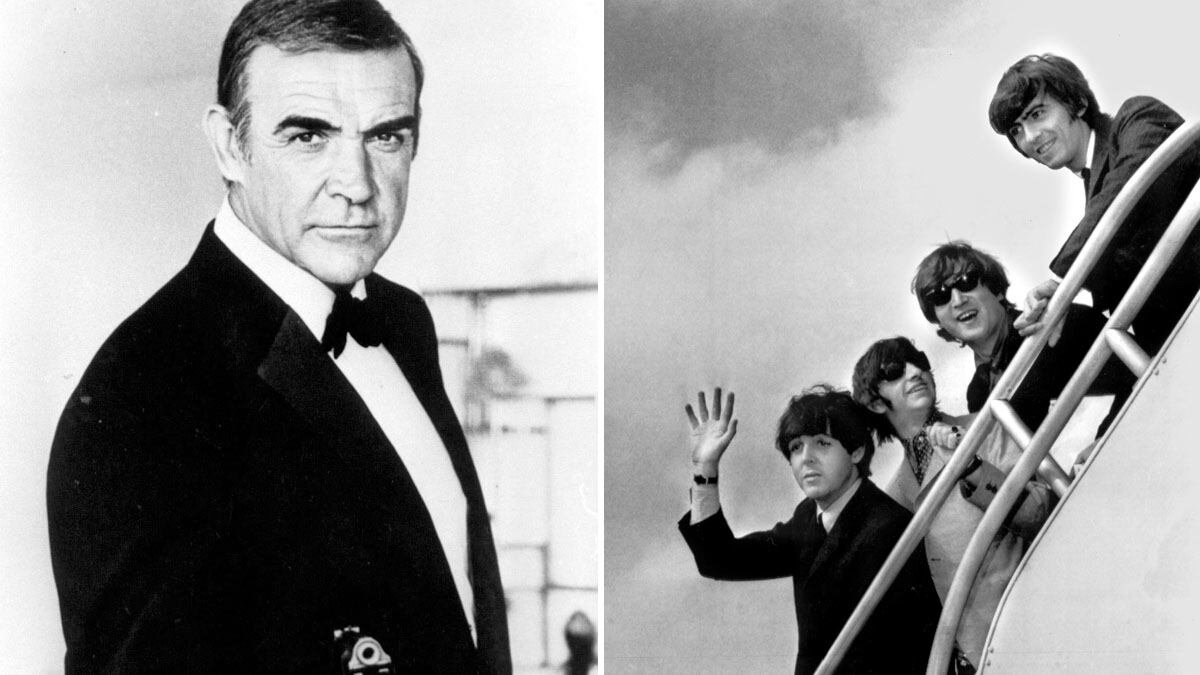Fifty years ago today, the world was introduced to the first James Bond movie and the first Beatles single on the same day. Both Dr. No and “Love Me Do” debuted Oct. 5, 1962. The world was about to change, although no one probably knew it at the time.
Dr. No inaugurated a movie franchise so successful that it would last through 22 films over half a century, weather several changes in its leading man, and hardly break stride. Fans may have preferred one or more 007 incarnations over the others, but it really doesn’t seem to have mattered who says “Bond, James Bond” or “Shaken, not stirred.” It’s the character, not the actor, whom people cotton to, and they’re still clamoring for more of him. Daniel Craig will fill Bond’s shoes for the third time—in the 23rd Bond movie—when Skyfall opens Nov. 9.

“Love Me Do” was a hit not once, but three times. When first released in Britain, it rose to No. 17 on the pop charts. In the U.S. it went to No. 4, and when it was rereleased in 1964, it went to No. 1. By then the Beatles were well on their way to becoming not just an insanely popular rock-and-roll band, but a band so successful that their breakup and the subsequent deaths of John Lennon and George Harrison did little or nothing to dent their popularity. It’s a safe bet that there’s no other band so beloved by 5-year-olds and their grandparents and an awful lot of people in between.
Success, however, is just about the only thing the Bond movies and the Beatles have in common.
Agent 007 is more or less immutable. He has adapted to a changing world only to the extent that the lapels of his tuxedo have narrowed or widened to remain in style, and he’s perhaps a little less misogynistic today than when Sean Connery first brought him to life.
The Beatles, on the other hand, were about nothing but change. In less than a decade, they remade the entire landscape of popular music. They spearheaded the British invasion of American pop, introduced psychedelia, made household words out of “peace and love,” and made it the rule rather than the exception that rock stars would write and perform their own songs. And for better or worse, they also made the studio, not the stage, their natural home. Without them, we might never have had the concept album (OK, so they weren’t perfect).
They were part of the ’60s counterculture, but an inextricable part. It’s flatly impossible to think of that decade without thinking about music, and it was the Beatles who gave music a centrality in popular culture that it’s never lost.
The Bond movies accommodated themselves to change. The Beatles had change built into their DNA. It is the difference between entertainment and art.
Watching the early Bond movies today is an exercise in making allowances. Dr. No is fairly nimble, because the filmmakers were still working out the formula (no gadgets yet), but the climax is rushed and laughable. By the time we get to Goldfinger, the pace has become, by the standards of today’s action movies, downright glacial. And for the next several decades, the Bond girls are strictly from bimbo city. The Austin Powers movies got tedious in a hurry, but their central point was well taken: the Rip Van Winkle-y Bond ethos is about as dated as the Nehru jacket.
Now listen to “Love Me Do.” Compared with what’s to come, it’s not a great Beatles song, but it’s energetic and fresh. Most strikingly, it hasn’t grown old. You can almost imagine a contemporary band releasing this song. Partly this is because the performance is so exuberant. But it’s also because the Beatles’ sound has had such a widespread influence. The may have built on the shoulders of giants (the Everly Brothers, Carl Perkins), but their close harmonies and jangly guitars were inimitable and endlessly imitated.
Nearly every other band borrowed from them—even the Rolling Stones went psychedelic for one album, with fairly disastrous results. But the Beatles’ most lasting legacy was their refusal to stand still. From album to album, even song to song, they changed, grew, and evolved. They even rebelled against themselves—Lennon’s last songs are proto-punk rejections of the complexity that he more than anyone had built into pop. This refusal to stay in one place for very long is less an option than a requirement for any contemporary pop musician.
The Bond movie franchise—created originally as a gaudy alternative to the grimness of the Cold War—has survived for 50 years because it embodies the timeless fantasies of sex and violence with no repercussions (he does, after all, have a license to kill). It succeeds to the degree that it can vary its formula without straying too far. The Beatles’ songbook lives because its creators threw formula out the window. The result was often art, which the poet Ezra Pound defined as news that stays news. And you don’t have to be a diehard Beatles fan (I’m not) to agree that their influence was immeasurable. Sgt. Pepper taught the band to play, and the band taught everyone else. The Beatles changed everything, forever.





